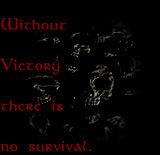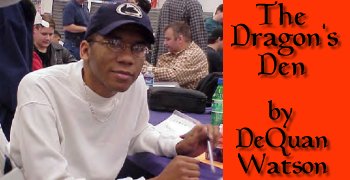|
|
|
|
|
|
|
|
|
|||
 |
||||||||||
|
|
|
|||||||||
 |
|
|||||||||
|
|
||||||||||
|
Taking the Gamble
11.29.04 I've watched a lot of
games of Magic of the years. Honestly, I can
say that number is probably in the tens of
thousands. Seriously. That's numbers not
unreal considering I judge tournaments every
week and I own a store that I watch people play
in all the time. Often times, when a game is
over, I want to try and help the players get
better.
Instead of just walking over and telling them
what was wrong with a particular play, I
generally try to find out why they made the play
that they did. I ask this, because the player
may have had some other information that I
wasn't privy to originally. Sometimes, looking
on in passing, may not give me all the
information I need to figure out what the proper
play is. More often than not I hear a set of
common phrases that tend to bug me, but often
lead to a poor play.
There are time to gamble and times NOT to
gamble.
"I thought..."
I usually here these two words followed by a
statement of fact that was obviously incorrect.
What's worse is that many times this comes after
the player has honestly set there and thought
about the situation for a second. Now, how can
a player sit and think for a full minute and
still make the wrong play? Easily. It comes
down to overthinking yourself.
There is a reason that you hear the good players
discuss getting together to play a particular
matchup for a full day. Practice like that
stops you from being able to overthink
yourself. If you lack confidence in your deck
or decision making, it just opens the doors to
more bad plays. If you understand the matchup,
you will know the percentages on what plays work
and what plays don't. You won't even think
about it. Many of them will be second nature to
you after a while. Part of that also comes down
to you simply being familiar with the deck that
you are playing as well. The more knowledge you
have, the more comfortable you are, and in turn
less mistakes will be made.
"I had to deal with that creature right
then!"
In place of the word creature, you could fill in
enchantment, artifact, or even land. This
statement usually comes out because I caught a
player wasting a card that potentially wins them
the game. This is caused because of a couple of
different reasons though.
The first is simple intimidation. Sometimes, a
situation can develop where you are lead to
THINK that a particular card is going to shift
the game in your opponent's favor. Often times,
a really good player can create a "mysticism"
about a card that draws attention to it. So,
it's good to take in the situation a little more
to ensure that you aren't just wasting a card.
Other times, players have bad history against a
particular. Then, when that card comes up in a
game, they are so paranoid about it, their whole
game plan begins to focus on killing that card.
One of the interesting things about most Magic
decks is that the same card doesn't always win
for you. Keep that in mind. Just because a
card is scary one time doesn't mean that it's
scary ALL the time.
Let's say that I have an Altar's Light in hand.
My opponent has a Darksteel Colossus in play. I
can use my card right then to get rid of the
Colossus, but why? My opponent may decide to
cast Might of Oaks on it, then I can get two for
one. What other creatures does he have out?
What life am I at? If you can suffer an attack
and still be at seven life, why not use that
Altar's Light the next turn to get rid of his
Platinum Angel and then attack with everything.
This seems like a very simple play, but it often
times gets missed.
"I countered it because I didn't want
him to have any creatures"
I'm sure most of you can guess where this one is
headed. I can sum this one up with one
statement, "You don't need to counter
everything." First of all, playing slower
control decks and playing against them, requires
a lot of decision making. You know this going
in, so don't get trigger happy with the spell
counters.
Countering everything isn't how you win games.
Counter critical cards and managing your
resources is. When I'm sitting across from a
player with the "itchy trigger finger" I will
toss junk spells in front of them just to watch
the counters fly. Why not? When your opponent
knows you are going to counter everything, they
will just toss spells that are irrelevant out
there just to draw them out. Then when you run
out of counters, that's when the problem cards
will begin to hit the table.
Look at a card for what it truly is before
countering it. If it's a creature, why worry
about it, if you have a Terror or Wrath of God
in hand? If it's an enchantment, look at what
it does. OK, so he wants to play a Fertile
Ground. He's already got 12 mana in play,
what's one more going to do to you?
"I thought he had..."
This is another situation that's caused by
players overthinking themselves. I've watched
too many players take defeat right out of the
jaws of victory (and yes I did word that
correctly). It's usually because they allow
themselves to get sidetracked with an irrelevant
thought.
If you are in a position to go for the win, go
for it. I generally try to pin it to a margin
of error. If the odds are against you having
whatever card it is that you need to have to
prevent the win, I'll go for it. If the odds
are higher than 20%, then I may sit back and
wait another turn to try whatever it is I'm
going to do.
Let me better explain that. If a player needs
to have a Shrapnel Blast to kill a particular
creature to stop me from attack for the win and
he has two cards in hand and three copies of
Shrapnel Blast in his graveyard, the odds are
pretty low that he doesn't have one in hand.
This warrants me swinging for the win.
Conversely, if that same player has been sitting
on two cards and hasn't seen a Shrapnel Blast
all game, I need to be a little more wary.
There are a ton of context clues to look at.
Take them all into account. There are even
times that the clock is against you in the round
and you need to rush to a third a game and you
are forced with making tough decisions.
Sometimes, you know the odds are 50/50, but you
have to cross your fingers and go for it.
"I didn't know what life he was at."
I'm ending with the one I should absolutely
NEVER hear from a player. Read that statement
again. Think about how silly that sounds. Your
opponent is no more than three feet from you,
yet you can't be bothered to ask them what their
life total is at? Honestly, you should be
keeping track of both players life totals
anyway.
Any obvious game state information should always
be checked if it is relevant to a game play.
I've often seen a player not attack because he
was unaware that he could attack for the win.
I've seen players use a burn spell to kill a
creature, not realizing that it would have won
the game. The only thing worse than this, would
be to realize how bad the play was a few turns
down the road.
Well, today wasn't about anything super secret
or revolutionary. It was simply to be an eye
opener to many players. Some players need to
speed up their play so they have less time to
think themselves out of a games. Others need to
slow just to be able to see the right play more
often. Just figure out what fits your playstyle.
Next time you lose a game, sit back and observe
your play open and honestly. You'll be
surprised what you can learn from yourself. You
just have to be willing to see it and improve
upon it. Hopefully these will be the first
steps to making many play less of a gamble for
you to make.
|
|||||||||

